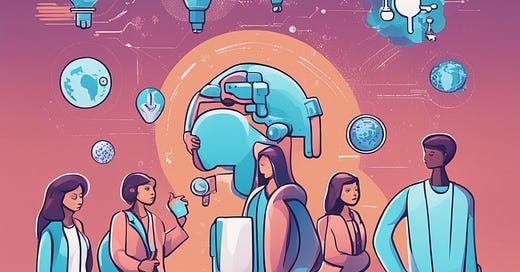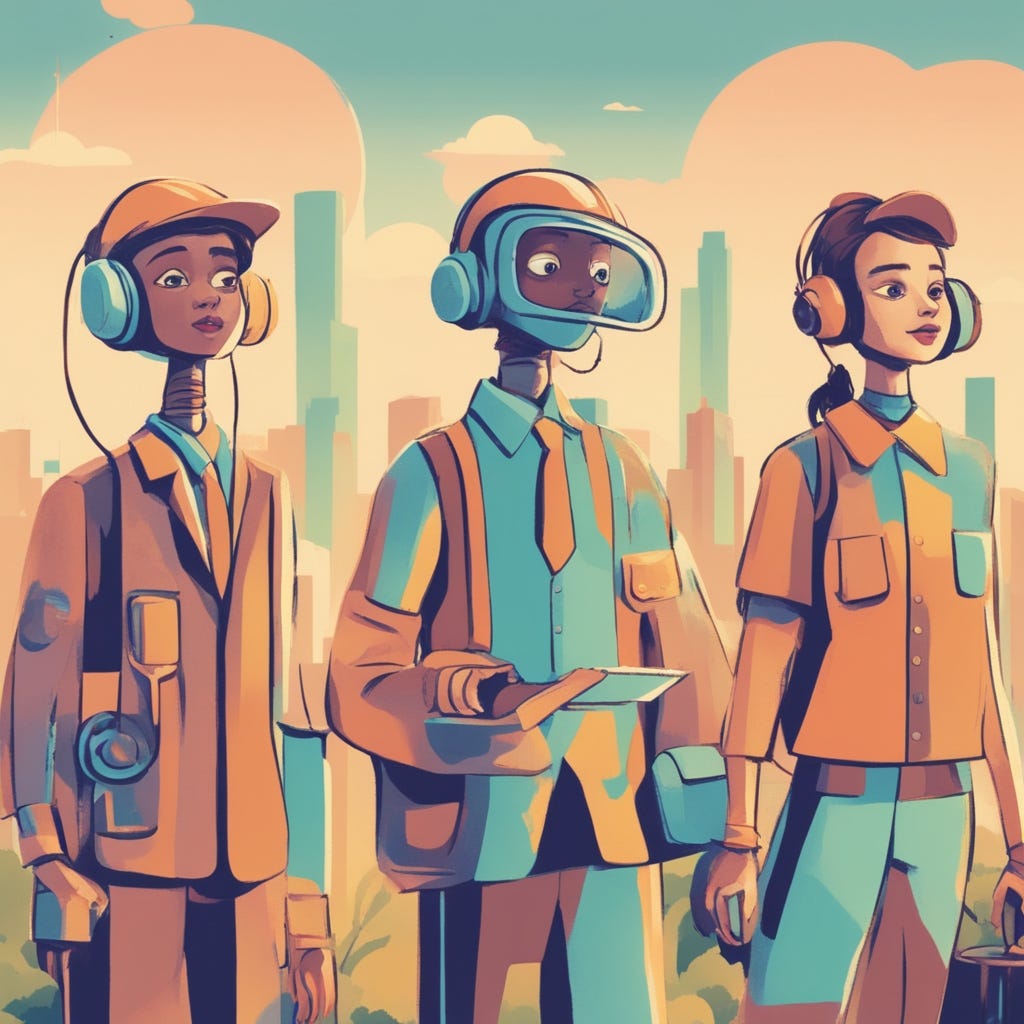Repurposing Gen Z
Looking to avoid being displaced by AI? Decent work in sustainability may be the answer.
Decent work sums up the aspirations of people in their working lives. Source: ILO
[The UK Government shares] an overarching ambition that all work should be fair and decent and for employers to offer opportunities that give individuals realistic scope to develop and progress. Source: Good Work Plan (UK Gov)
Gen Z's worldview is shaped by their upbringing in the digital age, making them tech-savvy and globally connected. This generation is entrepreneurial, adaptable, and driven by a desire to create a more equitable and sustainable world. Source: ChatGPT (adapted for UK English spelling)
Image: deepai.org (AI generated)
This post investigates the hypothesis that the AI we read about marching into many people’s jobs will, for many younger people training for what they think will lead to fulfilling careers, result in jobs that turn out to be a bit of an anticlimax. Expecting a nice gig as a digital marketer, business information guru or some other sought-after ‘knowledge worker’? – nah, the AI will do the knowledge bit, you just clerk around with the data.
Opinions on this do, of course, vary. Amongst the great and the good, we have in the blue corner Geoffrey Hinton, revving the media doom machine with predictions of the impact of AI on inequality; while in the red corner the likes of David Autor argue that nothing is inevitable, and with management and foresight the worst impacts of AI can be handled. Time alone will tell who, if anyone, is correct.
Now, since this post is about AI, it seems only fair that we use a little of the synthetic grey matter ourselves – with apologies to anyone who deeply mistrusts the stuff and may accuse us of blindly affirming facts that ChatGPT has made up simply because it doesn’t have the answer readily to hand in its (vast) training corpus.
So, let’s start with the question of how and where AI is affecting jobs. The recent OECD report on the subject seems to be a good place to kick off. Adobe Acrobat’s AI Assistant tells us that the report ‘…finds that high-skill occupations are the most exposed to AI, with certain skill groupings, such as management and business skills, being in high demand’.
That seems a little unclear: does it mean management and business skills are going to be more, or less in demand as a result of AI? We asked AI Assistant, but at that point Adobe told us our trial had finished and demanded money. So, we shifted to ChatGPT and asked it the same question. It concluded:
The integration of AI into business processes is transforming the landscape, but it is not diminishing the overall demand for management and business skills. Instead, it is shifting the focus towards a blend of technical literacy, human-centric capabilities, and adaptive leadership. Managers who can harness the power of AI while leveraging their uniquely human skills will be well-positioned for success in the evolving business environment.
Source: ChatGPT
Right, got that. Anyway, back to Adobe and that OECD report: before it got the begging bowl out, we’d asked it which occupations are most likely to be affected by AI. It referred us to a table on page 17 (which in fairness, we’d already found ourselves), listing Genetic Counsellors, Financial Examiners, Actuaries, Purchasing Agents, and Budget Analysts as being most affected1.
Genetic Counsellors? What exactly are they when they’re at home? Well, we could have looked for an AI-assisted answer to that, but knowing the aforementioned list of occupations had come from an AI analysis of the US’s Occupational Network (O*NET) database (Adobe told us that too), we simply ran a query on our own downloaded copy of the latest version of O*NET and found this:
Genetic Counsellors assess individual or family risk for a variety of inherited conditions, such as genetic disorders and birth defects. Provide information to other healthcare providers or to individuals and families concerned with the risk of inherited conditions. Advise individuals and families to support informed decision making and coping methods for those at risk. May help conduct research related to genetic conditions or genetic counselling.
Source: O*NET (occupation 29-9092.00)
Ah, right. Not exactly a job they’re queuing up at Jobcentre Plus for, although the others on the list are a little more mainstream. Take Budget Analysts for example. This is the type of job we might reasonably expect some of the young folk going through, say, Business Studies degrees to be aiming their AI-generated CV’s towards in a year or two’s time. O*NET does tend to indicate – using US education levels and data admittedly – that this is the case. We didn’t use AI for this chart, by the way – we knocked it up ourselves:
Required levels of education for Budget Analysts (O*NET occupation13-2031.00). Image: TGE from O*NET
So, how exactly are Budget Analysts being ‘exposed’ to AI? Further, how is that exposure affecting job satisfaction and, for young people coming out of education into jobs like these, how might this affect their expectations and worldview? Well, if the reader wishes to read the discourse we had with ChatGPT on the subject, the link is here. Otherwise, read on for a summary, interspersed with a thought or two of our own…
First, we learned that many of the nitty-gritty parts of the job sit right in AI’s sweet spots. AI is great for spotting trends and anomalies in large quantities of financial data; it can eat the predictive analysis tasks; write its own reports and create sophisticated data vizzes. It can do all the scenario analysis and stress testing, and even make sure everything’s being done according to the rules and regulations. And the dull, boring data crunching tasks? Naturally.
How might this comply with the job satisfaction aspect of decent work? Both positively and negatively, perhaps. On the positive side, reducing the mundane tasks means more time to focus on the big questions, potentially meaning less need for long nights to get the results and recommendations out. And, for those who really want to get into figuring out how AI does what it does, there are likely to be plenty of opportunities to move across into other jobs or even careers where AI is on the up and AI savviness is in short supply.
On the negative side, though, may come job insecurity and higher expectations of performance, with pressure to get on the continuous learning treadmill when at the end of the working day all that the AI-enhanced analyst wants to do is go home, feed and play with the kids, and maybe go down the pub later for a pint of Speckled Hen.
Will this come as a surprise to Gen Z, the generation born between around 1997 and 2012, currently coming through secondary schools, colleges or universities into the first part of what are often late-starting careers (compared with the Boomers, at least) that may take them through to their seventies?
Perhaps, but then again perhaps not. As digital natives, we could argue they’re in a much better position to ‘get’ AI and – AI ethics aside – realise opportunities for more meaningful, less mundane and even entrepreneurial applications of the technology. Solving problems, perhaps with a gaming twist to it, is part and parcel of what many of them do anyway, sometimes to the chagrin of their elders, while the potentiality to achieve more in less time, even from a home base, may well fit in the work-life balance goals of many Gen Zers.
And yet, we suspect it’s possible that more than a few may find themselves in dull, clerky-type jobs, feeding the hungry beast with limited opportunity to realise the job enrichment that AI promises, perhaps frustrated by older bosses who – like big data before it – don’t really understand how to ask the right questions of AI to get proper insights and actionable answers, and thinking “is this what I took on all this university debt for?”
Gen Z people sceptical about their AI-enhanced jobs and instead intent on doing decent work for a sustainable planet (apparently). Image: deepai.org from prompt by TGE.
Here’s the real point of this post. If it is the case that many Gen Zers are either doing or considering the types of further and higher education courses that seem to be popular among their generation, but which may be funnelling them towards early-stage career jobs that don’t exactly fit in with their expectations, then there may be an alternative.
We are, of course, talking about the types of crafts and trades associated with the manufacture, installation, operation and maintenance of the technologies for a sustainable world. There are the obvious ‘green’ or ‘greening’ jobs associated with things like welding and electricity, of course, but there’s also the Circular Economy, where hands-on work is marrying with AI, and more besides.
But that alternative, while fitting in with the Gen Z desire to create a more equitable and sustainable world, may call for a bit of repurposing (nice Circular Economy term, there) of the Gen Z worldview; from a generational preference for digital and technological careers towards those which are more manual, perhaps less flexible, but which could be offering a raft of fair and decent jobs, relatively unthreatened by AI and just begging for people to roll up their sleeves and get stuck into them.
Which, as ChatGPT seems to think, may be just the ticket for many Gen Zers.
The same table lists dancers, aerobic instructors and reinforcing iron workers among the least affected.








